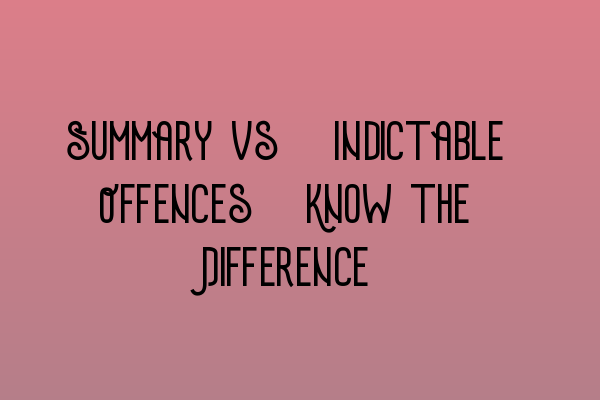Summary vs. Indictable Offences: Know the Difference
Welcome to the SQE Criminal Law & Practice Law UK blog! In today’s post, we’ll be discussing the difference between summary offences and indictable offences. Understanding this distinction is crucial for both law students and legal professionals.
Summary Offences
Summary offences, also known as minor offences, are less serious in nature and are typically tried in the lower courts, such as the Magistrates’ Court. These offences are usually less complex and carry lower maximum penalties compared to indictable offences.
Examples of summary offences include common assault, petty theft, criminal damage under a certain value, and public order offences. As a solicitor, it’s important to familiarize yourself with the specific summary offences relevant to your jurisdiction.
If you are preparing for the SQE 1 Practice Exam Questions or looking for SQE 1 Practice Mocks FLK1 FLK2, make sure to study the summary offences extensively as they are commonly tested topics.
Summary offences are often heard by a single magistrate or a panel of lay magistrates, and the trials are conducted in a less formal manner compared to indictable offences. The defendant does not have the right to a jury trial in summary proceedings, and the decisions are made by the presiding magistrate(s).
Indictable Offences
Indictable offences are more serious criminal offences and are typically tried in the Crown Court before a judge (and sometimes a jury). These offences require more complex legal procedures and often involve higher penalties.
Some examples of indictable offences include murder, manslaughter, robbery, rape, drug trafficking, and fraud. The distinction between indictable and summary offences determines the procedural flow of a case and affects the defendant’s rights during trial.
If you are aiming to become a criminal defense solicitor, it’s vital to have a deep understanding of indictable offences and the associated legal processes. Thorough knowledge of criminal law principles, evidence rules, and sentencing guidelines is essential in successfully representing clients accused of indictable offences.
For those preparing for the SQE 2 Preparation Courses or interested in SQE 1 Preparation Courses, make sure to cover indictable offences comprehensively, as they are integral to criminal law practice.
Unlike summary offences, indictable offences may have varying levels of seriousness, leading to their classification into three categories: indictable-only offences, either-way offences, and hybrid offences.
Indictable-only offences are the most serious crimes that can only be tried in the Crown Court. They include offences such as murder, rape, and treason.
Either-way offences are less serious than indictable-only offences but still carry significant penalties. These offences can be tried either in the Magistrates’ Court or the Crown Court, depending on their complexity and severity. Examples of either-way offences include theft, burglary, and drug possession with intent to supply.
Hybrid offences, also known as dual offences or semi-indictable offences, can be treated as either summary or indictable offences, depending on the circumstances and the defendant’s choice. The decision on how to proceed with these offences is usually made during the early stages of the legal process.
If you are interested in knowing more about the SRA SQE Exam dates, be sure to check out our article on SRA SQE Exam Dates.
Conclusion
In summary, understanding the difference between summary and indictable offences is crucial for law students and legal professionals. Summary offences are less serious, tried in lower courts, and carry lower penalties. Indictable offences, on the other hand, are more serious, require complex legal procedures, and often involve higher penalties.
To excel in your studies or legal practice, make sure to study and familiarize yourself with both types of offences. Utilize the resources available to you, such as the SQE 1 Practice Exam Questions and SQE 1 Practice Mocks FLK1 FLK2 for summary offences, and the SQE 2 Preparation Courses for indictable offences.
Remember, as a criminal law solicitor, your in-depth knowledge of both summary and indictable offences is vital in providing effective legal representation to your clients. Stay up-to-date with the latest legal developments, procedural requirements, and sentencing guidelines to excel in your career.
